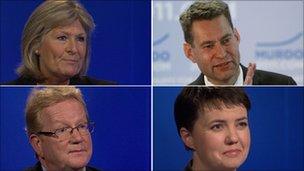A very polite Scottish Tory leadership fight
- Published
- comments

The four contenders include [top clockwise] Margaret Mitchell, Murdo Fraser, Jackson Carlaw and Ruth Davidson
It would appear that the contest for the leadership of the Scottish Conservatives, now a four-way fight, is becoming a mite heated.
I suppose that was only to be expected given that the election is no longer simply about leadership but about the intrinsic nature of the party and whether it should transform itself into a new model.
Being the Tories, the mutual distrust is expressed - thus far - in relatively polite and oblique terms. But even that has elicited a protest.
Ruth Davidson's camp issued a statement of support from Lord Forsyth which challenges the proposal by her rival Murdo Fraser that there should be a new centre-right grouping in place of the current Scottish Tories.
But Lord Forsyth goes further. He questions why Mr Fraser, with his plan, has also attracted the support of Sir Malcolm Rifkind.
Again, it is effortlessly polite. The Davidson camp and Lord Forsyth say they are "surprised" at Sir Malcolm's stance, noting that his views on the party's future appear to have changed.
In turn, the Fraser camp has issued a statement arguing that "it is extremely important that we avoid negative campaigning and temper our language".
On the face of it, one would think that they are protesting too much. Such personal criticism as there is in the Davidson statement is, as noted earlier, relatively constrained.
But, of course, there is history here. There is a back story. Both Malcolm Rifkind and Michael Forsyth are former Scottish secretaries: in essence, former leaders of the Scottish Tories.
It is fair to say that they did not entirely agree with each other about the direction of the party with regard to social and economic policy plus the issue of self-government.
So, for Tories, Lord Forsyth implicitly criticising Sir Malcolm carries with it memories of earlier contention within the party.
Hence, perhaps, the Fraser camp is alert to such nuances.
To be clear, the primary purpose of Lord Forsyth's intervention is not to criticise individuals but to oppose the proposal advanced by Murdo Fraser.
Given the extent of the change involved, he is perfectly entitled to do so - and, indeed, that point is acknowledged by Team Fraser.
Lord Forsyth argues that remoulding the Tories, as Murdo Fraser wants, would condemn the party to years of internal wrangling just as the independence referendum looms.
Scottish history
For his part, Mr Fraser insists that the Scottish Tories have "an identity problem" and require fundamental transformation to survive and thrive.
As is his wont, Lord Forsyth resorts to some colourful imagery in pursuing his point.
He says that for the Scottish Conservative and Unionist Party to "disband" would be "the greatest political error since Bonnie Prince Charlie turned back at Derby to face certain defeat".
Michael Forsyth, of course, has considerable form in the matter of resorting to Scottish history. He it was who caused the Stone of Destiny to be brought back to Scotland.
I also recall him, in a speech at Stirling University, querying why Scots appeared to prefer William Wallace (who ultimately failed) to Robert the Bruce (who won.)
At the time, he predicted wryly that the press would cover this speech along the lines of "Forsyth calls Wallace a loser."
He was, of course, entirely correct in that presumption.
Still, the choice of a Stuart image seems particularly salient, given the substantial overlap there was, historically, between the Jacobites and the old Tories.
Indeed, perhaps the new model party might be called the Jacobites - if that were not thought to be too discourteous to the present occupant of the throne.